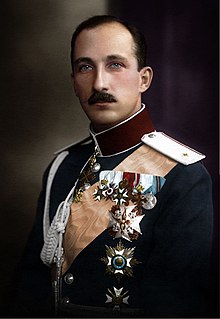
Back بوريس الثالث ملك بلغاريا Arabic بوريس الثالث ملك بلجاريا ARZ Boris III AST III Boris Azerbaijani اۆچونجو بوریس (بولغارستان) AZB Барыс III Byelorussian Борис III Bulgarian Borís III de Bulgària Catalan Boris III. Czech Boris 3. af Bulgarien Danish
| Boris III | |||||
|---|---|---|---|---|---|
 | |||||
| Tsar of Bulgaria | |||||
| Reign | 3 October 1918[1] – 28 August 1943 | ||||
| Predecessor | Ferdinand I | ||||
| Successor | Simeon II | ||||
| Born | 30 January 1894 Vrana Palace, Sofia, Bulgaria | ||||
| Died | 28 August 1943 (aged 49) Sofia, Bulgaria | ||||
| Burial | |||||
| Spouse | |||||
| Issue | |||||
| |||||
| Bulgarian | Борис III | ||||
| House | Saxe-Coburg and Gotha-Koháry | ||||
| Father | Ferdinand I of Bulgaria | ||||
| Mother | Marie Louise of Bourbon-Parma | ||||
| Religion |
| ||||
| Signature |  | ||||
Boris III (Bulgarian: Борѝс III ; Boris Treti; 30 January [O.S. 18 January] 1894 – 28 August 1943), originally Boris Klemens Robert Maria Pius Ludwig Stanislaus Xaver (Boris Clement Robert Mary Pius Louis Stanislaus Xavier),[a] was the Tsar of the Kingdom of Bulgaria from 1918 until his death in 1943.
The eldest son of Ferdinand I, Boris assumed the throne upon the abdication of his father in the wake of Bulgaria's defeat in World War I. Under the 1919 Treaty of Neuilly, Bulgaria was forced to cede various territories, pay crippling war reparations, and greatly reduce the size of its military. That same year, Aleksandar Stamboliyski of the Bulgarian Agrarian National Union became prime minister. After Stamboliyski was overthrown in a coup in 1923, Boris recognized the new government of Aleksandar Tsankov, who harshly suppressed the Bulgarian Communist Party and led the nation through a brief border war with Greece. Tsankov was removed from power in 1926, and a series of prime ministers followed until 1934, when the corporatist Zveno (Bulgarian: Звено) movement staged a coup and outlawed all political parties. Boris opposed the Zveno government and overthrew them in 1935, eventually installing Georgi Kyoseivanov as prime minister. For the remainder of his reign, Boris would rule as a de facto absolute monarch, with his prime ministers largely submitting to his will.
Following the outbreak of World War II, Bulgaria initially remained neutral. In 1940, Nazi sympathizer Bogdan Filov replaced Kyoseivanov as prime minister, becoming the last prime minister to serve under Boris. In September 1940, with the support of Nazi Germany, Bulgaria received the region of Southern Dobrudja from Romania as part of the Treaty of Craiova. In January 1941, Boris approved the anti-Semitic Law for Protection of the Nation, which denied citizenship to Bulgarian Jews and placed numerous restrictions upon them. In March 1941, Bulgaria joined the Axis and allowed German troops to use Bulgaria as a base from which to invade Yugoslavia and Greece. Bulgaria then received large portions of Yugoslav Macedonia, Pirot County in eastern Serbia and Greek Thrace, which were key targets of Bulgarian irredentism. Bulgaria opted out of participation in the German invasion of the Soviet Union, as allowed by the provisions of the Axis alliance. As part of the Holocaust, Bulgarian authorities deported most Jews from occupied Greek and Yugoslav territories and transferred them to the German extermination camp of Treblinka. Under public pressure, Boris cancelled the deportation of Bulgarian Jews while expelling almost 20,000 Jews to the Bulgarian countryside to be deployed in forced labor camps. In 1942, Zveno, the Agrarian National Union, the Bulgarian Communist Party, and other far-left groups united to form a resistance movement known as the Fatherland Front, which went on to overthrow the government in 1944. In August 1943, shortly after returning from a visit to Germany, Boris died at the age of 49. His six-year-old son, Simeon II, succeeded him as tsar.
- ^ Palmer, 1978, The Kaiser, p 206
Cite error: There are <ref group=lower-alpha> tags or {{efn}} templates on this page, but the references will not show without a {{reflist|group=lower-alpha}} template or {{notelist}} template (see the help page).